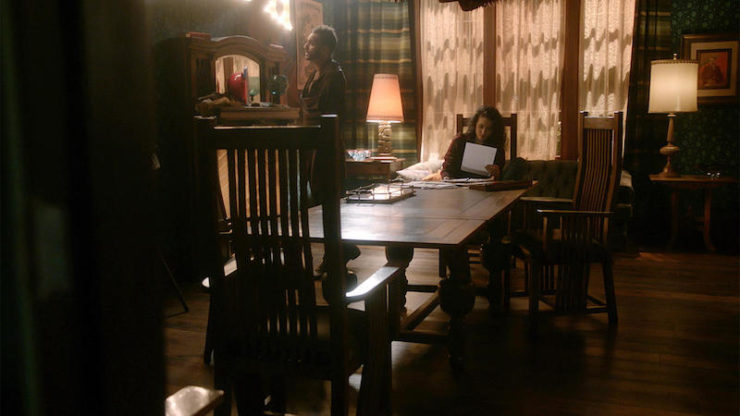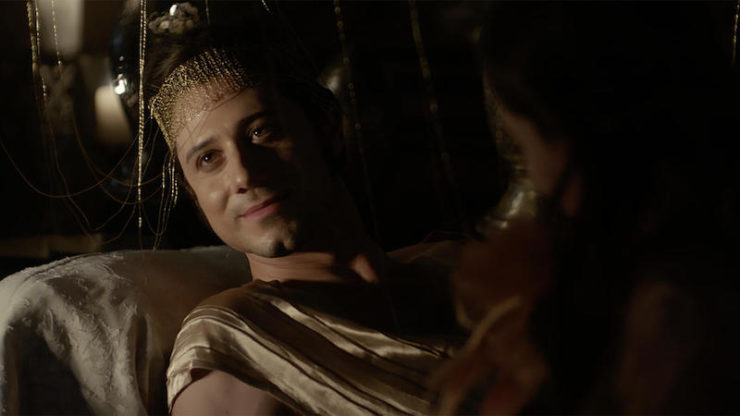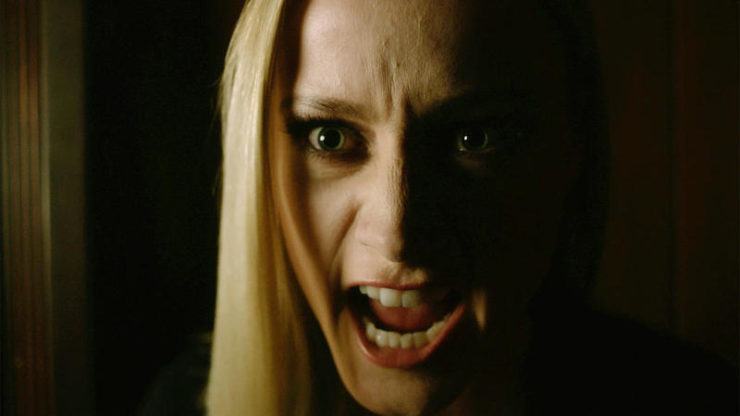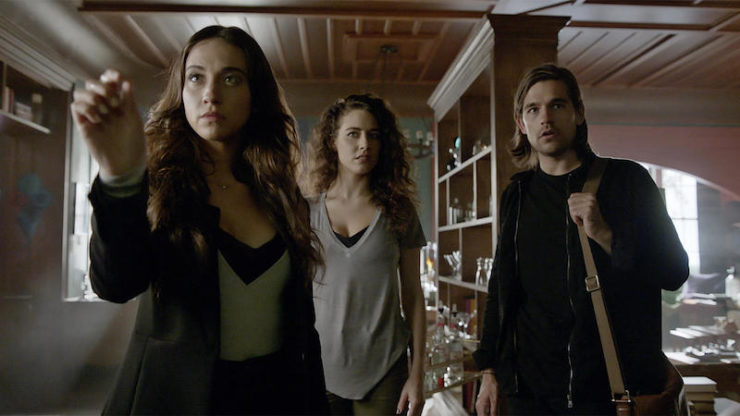For a while now, there’s been some disagreement among Magicians watchers about Julia: Are her choices and actions justified? Is she doing what she needs to, or just being a jerk?
The argument’s a little different now that the complication from her demigod exorcism is clear. Julia isn’t who she used to be—and not just because she’s picked up Martin Chatwin’s annoying musical habits. She watches her semi-friends like they’re a strange experiment she doesn’t fully comprehend. Stella Maeve does an amazing job with Julia’s new take on the world. What does it look like when you don’t have a shade?
“Word As Bond” is as thoroughly a mid-season episode as an episode could possibly get: everything is rotten, and nothing gets resolved. Fillory continues to be the land where magic doesn’t work reliably and is no fun anyway. The details of the impending war with Loria feel like a distraction that primarily serves to build to Julia’s worst choice: burning down a forest full of endangered, intelligent trees. Sure, the trees are dicks, but they didn’t really deserve to get exploded. Shadeless Julia only sees her action as a means to an end—and one that takes the responsibility off Margo’s shoulders. She’s shortsighted and, ultimately, selfish: the tree fire was also a means for her to get an invisible-to-gods spell from Loria’s bald illusionist.
That spell was a good call, given that Reynard came after her the minute she stepped outside Brakebills’ wards. Tragically, the tiresome trickster remains relevant, and Julia’s hit on the idea of finding Dana’s son and harnessing his demigod power in order to destroy Reynard. What’s more interesting than Reynard’s weird gloating is Quentin’s quick thinking. He’s got to be terrified—he knows what Reynard does—but he has the magic teleportation button, and does what no one else could: gets Julia the hell out of there.
Of course, that’s how she winds up in Fillory, interrupting Margo’s councilors and killing trees. An excellent thread of accountability ties these characters together. The more they all work together, save each other, love each other, resent each other, the more the show demonstrates how their actions all connect. The Brakebills gang can get mad at Julia, but they’re not disconnected from what she’s done, emotionally or practically speaking.

And this week is full of emotional moments. Penny trying to have a talk with Kady was a great, vulnerable scene for the smartass traveler, but Kady’s resistance to their relationship was just as telling. I was sort of hoping these two wouldn’t have to talk it out—at least not yet—but watching her defensive reaction to Penny’s overtures is a reminder that she’s been through a lot, even if much of it was offscreen. Theirs is a complicated relationship, as you can see on Penny’s face as he processes her reactions. He doesn’t give up; he opts for action over words, and signs himself over to a life of servitude to the Library in order to obtain the information that might help defeat Reynard. Kady feels like she owes Julia, whoever Julia is now; Penny sees that as something he can help with. She doesn’t want a hero, but that’s not what he’s trying to be.
Penny: “I love you, ok? Deal!”
Kady: “… shit.”
Penny’s vulnerability, as perfect as it is, is not the episode’s most nakedly emotional scene. That would be Margo, having chased the Fillorian healer and Fen from Eliot’s bedside, where he needs to move his consciousness from the dead golem back into his own body. Alone, her chin starts to shake:
“Eliot? You need to come back. I know that you have a constant low-key death wish but you can’t leave. They don’t want me. They want the high king. I’m faking it, El. So if you could just, please, please wake up…”
They don’t want me. Margo is highly capable, no bullshit, good at so many things, but Fillory doesn’t want her. The trees scoff at the idea of two females coming to negotiate. There’s no reason for any of this—she’s better at ruling than Eliot—but it’s how it is, and she’s exhausted of it.

Even still, when magic suffers another brownout the next time they try to wake Eliot up, she goes full mama bear at the sight of Fen’s tears, because if there’s one thing Margo knows how to do, it’s rise to a challenge:
“Well, you got me. I’m gonna take care of you and the kid. I will untangle this war shit somehow. I know the high king has the power but I will hunt Ember to the ends of the world to have that stupid rule rewritten. Everything El promised, I’m gonna deliver, you hear me?”
Thankfully, she isn’t alone anymore.
Eliot: “Listen to high king Bambi.”
Margo: “Nice of you to join us, asshole.”
Eliot: “It really does sound like you’ve got it all handled.”
Margo: “I do, but it’s more fun with you.”
“But it’s more fun with you.” This ties to the thing Kady has trouble understanding: Penny doesn’t doubt her capabilities. He’s not trying to save her out of some notion that she can’t do it herself. He knows she can handle all kinds of hell (and damn, does she know how to swing a fist). But they also make a great team.
You know who doesn’t make a great team? Quentin and niffin-Alice, who is remarkably good at making the most of the 30 minutes she spends controlling his body each night. She drags them off on a quest to find a monk who turns out to be a much older, much wiser niffin—one with no time for a baby niffin who can’t even get out of a “shoddy little magician.” But if she can get herself free, he may have a thing or two to show her. If Quentin trying to keep a niffin in his body doesn’t kill them both first.

“Word As Bond” moves a lot of pieces around the board, setting up larger conflicts: How will niffin-Alice get free? Will the war with Loria happen? What do you do when your best friend loses her conscience? Can Fillory stop being so sexist? Behind all that, though, the show is trying to get at something about women and power, though it’s still unclear what exactly it’s trying to say.
The two women who, at the end of last season, wound up with god powers (one terrible way or another) have now turned into selfish, cruel creatures, one a niffin, one a heartless woman without her shade. On the surface, they’re pretty terrible—manipulative, cruel, self-centered, happy to use their “friends” to their own gain. But what’s this really about? Is it about the potentially toxic nature of a power structure that privileges masculine power? A critical look at how gendered ideas about behavior often requires women to act “like men” in order to gain or keep power—to shed traits that are considered feminine, like empathy or kindness? Is it about how the world (ours, or Fillory) views powerful women, no matter where that power comes from? It’s certainly about something—but whatever that something is, it’s still hiding under The Magicians’ hat.
MAGICAL TIDBITS
- Why does the librarian hate Mayakovsky so much?
- “Stop singing Imagine Dragons to get me off the track!” Quentin truly has the least imaginative musical taste.
- That really sweet reminder that Margo knows the Fillory books, too—she’ll enchant a mirror if she needs to talk to Q.
- “In the parlance of your time? Fuck you. Pay me. Fresh meat. Newborns are the sweetest.” Ancient beasties hiding behind the faces of little kids will never cease to both delight and horrify me.
- “Yeah, glassjaw, not a surprise. Don’t look at me! Incept him!”
Molly Templeton would also like to mention that the Fillorian sloth is actually from the books. Sort of. She’s maybe less bloodthirsty in them?










